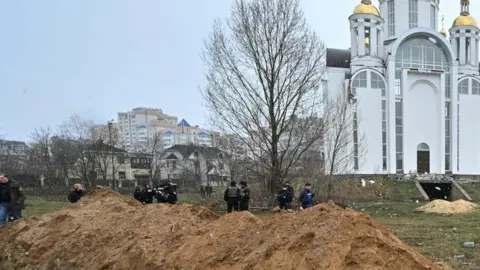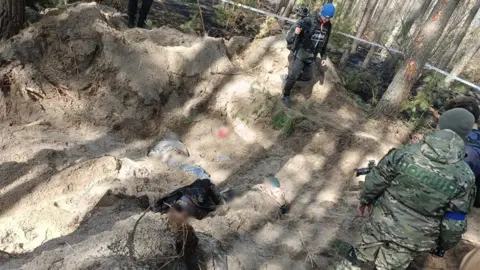Ukraine war: Ukraine investigates alleged execution of civilians by Russians
 Getty Images
Getty ImagesUkraine has started a war crimes investigation after bodies of civilians were found strewn on the streets as Russian troops pulled out of areas around the capital Kyiv.
Bucha and Irpin were symbols of resistance to the Russian invasion, but they are now becoming synonymous with the war's most serious abuses.
Ukrainian authorities say the bodies of 410 civilians have been found in the areas around Kyiv so far.
Russia, without evidence, says the photos and videos are "a staged performance" by Ukraine.
But what officials and reporters have seen there in the wake of the Russian withdrawal has left many in deep shock.
Warning: This report contains distressing images and content.
What happened in Bucha?
Two or three days after Russia launched the 24 February invasion of its neighbour, a column of Russian tanks and armoured personnel carriers (APC) that had arrived in Bucha was attacked by Ukrainians, stalling the advance.
The Russians reinforced and stayed in the area on the outskirts of the capital, unable to move forward much, until they began pulling out on 30 March.
Many civilians had fled the area - but some stayed behind, trying to avoid the Russians. It is during this period that Russians reportedly started going house to house.
Witnesses have described how Russian soldiers fired on men fleeing after refusing to allow them to leave through humanitarian corridors.
Officials and reporters who went in after the Russians had left saw tanks and APCs, alongside at least 20 dead men lying in the streets.
Many had extensive wounds - some had been shot through the temple, as if executed. Some had their hands - or legs - tied. Others had clearly been run over by tanks.
Satellite images taken by Maxar show a 14m (45ft) mass grave in Bucha near the church of St Andrew and Pyervozvannoho All Saints.


The company says the first signs of excavation were spotted on 10 March - not long after the launch of the Russian invasion of Ukraine.
And Bucha residents have said the first bodies were buried there in the first few days of the war, as Russians killed scores by "shooting everyone they saw". Estimates of those buried range from 150-300.
Warning: Distressing image below
'Shot in the back of the head'
Human Rights Watch has gathered evidence of alleged war crimes in Bucha and other cities and towns under the control of Russian forces.
In a report published on 3 April 2022, it recorded an account of an incident in Bucha on 4 March in which Russian soldiers forced five men "to kneel on the side of the road, pulled their T-shirts over their heads, and shot one of the men in the back of the head".
And more gruesome details continue to emerge.
The BBC's Yogita Limaye visited the basement of a home in Bucha where the bodies of five men wearing civilian clothes were left. They had their hands bound behind their backs and appeared to have been shot dead.
The Ukrainians say similar accounts are surfacing elsewhere and will be investigated.
In the nearby village of Motyzhyn, a BBC team were taken to see a shallow grave - four bodies were visible, and Ukrainian officials said there could be more.
Three of the bodies have been identified as that of the head of the village Olga Sohnenko, her husband and her son. The fourth has not been identified yet.
It is unclear when they were killed.

The areas around Kyiv now back under Ukrainian control include the commuter town of Irpin, where heart-breaking images showed civilians fleeing under Russian fire for days on end.
There were cases of people being shot at as they did so. On 6 March four civilians - a woman, her teenage son, her daughter of around eight years of age, and a family friend - were all killed by mortar fire as they tried to cross a battered bridge.
In another incident, a mother and son were also killed and buried by neighbours in the courtyard of the block of flats.
On 7 March, drone footage showed a car on a road outside Kyiv, from which a man emerges with hands raised. His body falls to the ground. Maksim Iovenko, 31, was shot dead by Russian forces that were positioned at the roadside. His wife Ksenia, who was in the car, was also killed.
The HRW report includes the case of a mother in the city of Kharkiv, who was raped by a 20-year-old Russian soldier inside a school where civilians were sheltering.
And many more.
Accusations of war crimes and genocide
President Volodymyr Zelensky has no doubt that Russian troops are committing war crimes and even genocide against his people. Genocide is understood by most to be the gravest crime against humanity. It is defined as a mass extermination of a particular group of people - exemplified by the efforts of the Nazis to eradicate the Jewish population in the 1940s.
"The world has already seen many war crimes. At different times. On different continents. But it is time to do everything possible to make the war crimes of the Russian military the last manifestation of such evil on earth," Mr Zelensky said on Sunday, as evidence of the murders of Bucha became public.
He told US network CBS's Face the Nation programme: "Indeed. This is genocide.
"The elimination of the whole nation, and the people. We are the citizens of Ukraine. We have more than 100 nationalities. This is about the destruction and extermination of all these nationalities."
Many Western countries have expressed their horror at the images of bodies strewn on city streets.
But Russia remains defiant. It says its operation - which they refuse to call a war of invasion - is proceeding according to plan, and that accusations of war crimes are all fake.

War in Ukraine: More coverage
- LIVE: Latest updates from Ukraine
- A FAMILY LOST: Father grieves couple killed outside Kyiv
- SECURITY: Europe's new era facing Russian threat
- WATCH: One woman's journey out of Ukraine in real time
- READ MORE: Full coverage of the crisis
